http://www.globalpolicyjournal.com/blog/03/01/2017/world-shambles-interview-cj-polychroniou
Interviewed by Marcus Rolle and Alexandra Boutros – 3rd January 2017
“We live in ominously dangerous times” stated the opening line of an article by C.J. Polychroniou (with Lily Sage) titled “A New Economic System for a World in Rapid Disintegration,” which was recently published in Truthout. And while the aforementioned piece was mainly a scathing critique of global neoliberal capitalism and a call for a new system of economic and social organization, its underlying thesis was that the world system is breaking down and that contemporary societies are in disarray.
Is the (Western) world in shambles? We interviewed C.J. Polychroniou about the current world situation, with emphasis on developments in Europe and the United States, and sought his views on a host of pertinent political, economic and social issues, including the rise of the far right and the capitulation of the left.
Marcus Rolle and Alexandra Boutri: Let’s start by asking — what exactly do you have in mind when you say, “We live in ominously dangerous times?”
C.J. Polychroniou: We live in a period of great global complexity, confusion and uncertainty. It should be beyond dispute that we are in the midst of a whirlpool of events and developments that are eroding our capability to manage human affairs in a way that is conducive to the attainment of a political and economic order based on stability, justice and sustainability. Indeed, the contemporary world is fraught with perils and challenges that will test severely humanity’s ability to maintain a steady course towards anything resembling a civilized life.
For starters, we have been witnessing the gradual erosion of socio-economic gains in much of the advanced industrialized world since at least the early 1980s, along with the rollback of the social state, while a tiny percentage of the population is amazingly wealthy beyond imagination that compromises democracy, subverts the “common good” and promotes a culture of dog-eat-dog world.
The pitfalls of massive economic inequality were identified even by ancient scholars, such as Aristotle, and yet we are still allowing the rich and powerful not only to dictate the nature of society we live in but also to impose conditions that make it seem as if there is no alternative to the dominance of a system in which the interests of big business have primacy over social needs.
In this context, the political system known as representative democracy has fallen completely into the hands of a moneyed oligarchy which controls humanity’s future. Democracy no longer exists. The main function of the citizenry in so-called “democratic” societies is to elect periodically the officials who are going to manage a system designed to serve the interests of a plutocracy and of global capitalism. The “common good” is dead, and in its place we have atomized, segmented societies in which the weak, the poor and powerless are left at the mercy of the gods.
I contend that the above features capture rather accurately the political culture and socio-economic landscape of “late capitalism.” Nonetheless, the prospects for radical social change do not appear promising in light of the huge absence of unified ideological gestalts guiding social and political action. What we may see emerge in the years ahead is an even harsher and more authoritarian form of capitalism.
Then, there is the global warming phenomenon, which threatens to lead to the collapse of much of civilized life if it continues unabated. The extent to which the contemporary world is capable of addressing the effects of global climate change — frequent wildfires, longer periods of drought, rising sea levels, waves of mass migration — is indeed very much in doubt. Moreover, it is also unclear if a transition to clean energy sources suffices at this point in order to contain the further rising of temperatures. To be sure, global climate change will produce in the not-too-distant future major economic disasters, social upheavals and political instability.
If the climate change crisis is not enough to make one convinced that we live in ominously dangerous times, add to the above picture the ever-present threat of nuclear weapons. In fact, the threat of a nuclear war or the possibility of nuclear attacks is more pronounced in today’s global environment than any other time since the dawn of the atomic age. A multi-polar world with nuclear weapons is a far more unstable environment than a bipolar world with nuclear weapons, particularly if we take into account the growing presence and influence of non-state actors, such as extreme terrorist organizations, and the spread of irrational and/or fundamentalist thinking, which has emerged as the new plague in many countries around the world, including first and foremost the United States.
What is the state of the Left in today’s Europe?
Since the collapse of Soviet communism, the European Left has been in a state of complete disarray, although the crisis of Europe’s Left dates back to the 1970s — i.e., long before the collapse of “actually existing socialism.” But let’s be clear. What do we mean today by the term European Left? The European Socialist and Social Democratic parties abandoned long ago any pretext to being “socialistic” and, in fact, have become advocates of austerity and staunch supporters of free-market capitalism. There are some communist parties still around, but most of them are completely marginalized and lack political influence.
Only in Greece do you have a communist party that still carries some influence inside the labor movement, but it is essentially a Stalinist party and has actually worked hard to maintain political stability and thus the status quo. Nonetheless, until very recently, the Greek Communist Party was far more popular than the Coalition of the Radical Left, popularly known as Syriza, which has been in government since January 2015, thanks to the terrible financial and economic crisis that broke out in early 2010 and has since converted the country to a German/European protectorate.
There are, of course, grassroots movements and parties of the radical Left to be found in virtually every European country, but they lack mass popular support. The rise of Syriza in Greece was seen as representing a new dawn for the European Left, but its complete sellout to the euro masters and its actual conversion to a neoliberal and thoroughly corrupt political party has actually been one of the biggest setbacks for progressive forces throughout the continent.
You were expressing strong reservations about Syriza, in fact through these pages, long before its rise to power. What actually went wrong with the Greek Radical Left?
Syriza was a loose organization of various leftist groups (old-fashioned euro communists, anarcho-communists, Maoists and even social democrats), and its appeal was confined mainly to the intellectual class. It lacked a cohesive ideological worldview and, in fact, [it] was difficult to pinpoint its stance on a variety of crucial issues due to the many political factions that it represented.
Naturally, the great majority of the Greek voters saw Syriza as being nothing more than a movement of political clowns, with Alexis Tsipras at its helm. However, a close look around Syriza’s core leadership would have revealed a group of people who were simply political opportunists, people hungry for power. To me, therefore, it was obvious that, in the event that Syriza came to power, two things would happen: first, a split between radicals and opportunists, and second, the capitulation of the opportunists (Alexis Tsipras and his gang) to the domestic economic elite and the euromasters. And this is precisely what has happened.
After five years of brutal austerity and the sharpest decline of the standard of living in any postwar European country, the Greek people voted into power Syriza, believing that its leader, Alexis Tsipras, would carry through with his pre-election promises of ending austerity and subsequently re-boosting the economy, tearing into pieces the EU/IMF bailout agreements, and forc[ing] the cancellation of a major portion of the debt. But shortly after coming to power, the opportunists realized that the option was either complete surrender to the capitalist forces or stepping down from power. They opted for the former, just so they could stay in power, even if it meant completing the carry out of the neoliberal agenda of the European Union and the IMF as part of the financial bailout of the country.
Syriza has been in power for nearly two years now, and, during this time, it has shoved the neoliberal agenda down the throat of the Greek people with more forcefulness and determination than any previous government. It agreed to a new, far more brutal and humiliating bailout plan, and is now overseeing the complete privatization of the economy and the further deterioration of the standard of living, thereby fulfilling the long-held view of the European neoliberal masters that Greek wages and the nation’s standard of living should not be above those found in nearby Balkan countries like Bulgaria and Romania. Any public official or government minister standing in the way to the implementation of the neoliberal agenda was either isolated or pushed out of the government. Indeed, one of Tsipras’ most pronounced traits as prime minister of Greece is the ease with which he is selling out his former comrades.
To secure his goals and aims, i.e., the sellout of the country, he even ended up recruiting as his lackeys academics from abroad, such as the president of the (allegedly progressive) Levy Institute, Dimitri Papadimitriou, and his wife, Rania Antonopoulos, who is currently serving as the Greek Alternate Minister for Combatting Unemployment. Shortly after having accepted the position of Minister of Economy and Development as a result of a recent cabinet reshuffle, Papadimitriou — when asked about his research as an economist in which he challenged the European dogmas of austerity and neoliberalism and advocated the introduction of a “parallel” currency for the deeply ailing Greek economy — replied by saying that, “until last week I was an academic, and academics may say … things. But when the time comes to implement a program, then they realize that some things may have been wrong!”
Of course, the Greek media had a feast over the amazing opportunism and the hypocrisy of this man, but his reaction has been rather typical among pseudo-progressives and social democrats all throughout modern history. Unsurprisingly, Papadimitriou also went on to say that Greeks, Spaniards and Italians live beyond their means, thereby displaying his obedience to the EU and IMF masters, and that one of the major comparative advantages that Greece now enjoys is that it is a country with “cheap labor.”
What has been happening in Greece may represent an extreme example because of the actual state of the economy, but it is quite representative of the state of politics of contemporary European Left. That is, a Left without political convictions and values, a Machiavellian Left that prefers to serve the Masters of Mankind than seek to reorganize society from below.
What is your explanation for the rise of Donald Trump, and do you actually see a future in “Trumpism”?
Understanding the phenomenon of Donald Trump demands that we look beyond the individual himself and, instead, into the way US society has evolved over the last few decades. Millions of Americans have seen their livelihoods either entirely collapse or be threatened by economic forces which they neither understand or control. For example, they (and Donald Trump) blame Mexico and China for the loss of American jobs, but no one is taking the trouble to point out to them that the bulk of the products that China, for example, exports to the United States are being produced by US or multinational corporations who opted to move their operations outside the US in order to take advantage of cheap labor opportunities. In the meantime, wages in the US have remained stagnant over the course of the last 25 years for the great majority of the population, while the economy has grown considerably. But the economic gains end up almost exclusively in the hands of a tiny corporate and financial elite, which also controls the political agenda.
“Trumpism” and disingenuous populism represent the future of American politics, especially since the economic policies that the Trump administration will implement will surely further deteriorate the state of inequality in this country and thus do nothing to ameliorate anger and anxiety about the future, which were the driving forces that sent so many people into Donald Trump’s arms.
Note: This interview has been condensed and edited for concision. Reprinted with permission from Truthout.
https://www.rt.com/news/355819-fidel-castro-ussr-visit/
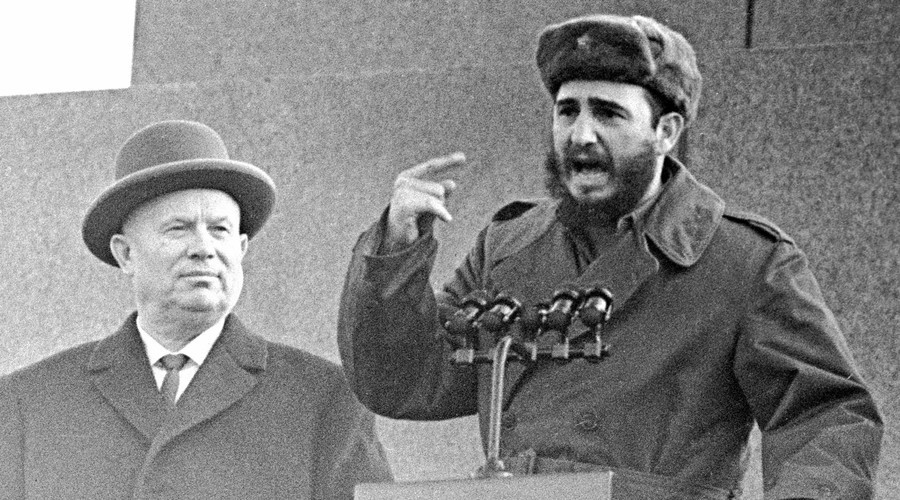
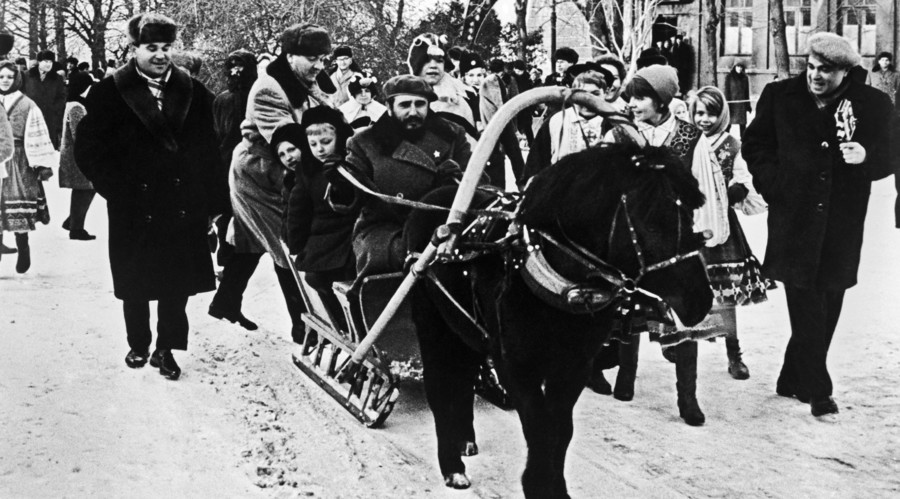
Propelled to power by the Cuban Revolution in 1959, and having instantly become a role model for revolutionary movements, Fidel Castro first visited the USSR in 1963, aged 36. Four years prior to his visit, Havana established diplomatic ties with Moscow. Having been the Soviet Union’s ally during the Cold War, relations between the two nations’ leaders cooled in 1962, when USSR’s Nikita Khrushchev removed Soviet missiles from the Caribbean island following an agreement with American President John F. Kennedy. Castro said the Soviet leader did it all behind his back.
To sugar the pill for Castro, Khrushchev proffered him a personal invitation to travel to the USSR. The visit turned out to be a 38-day tour all around the country.
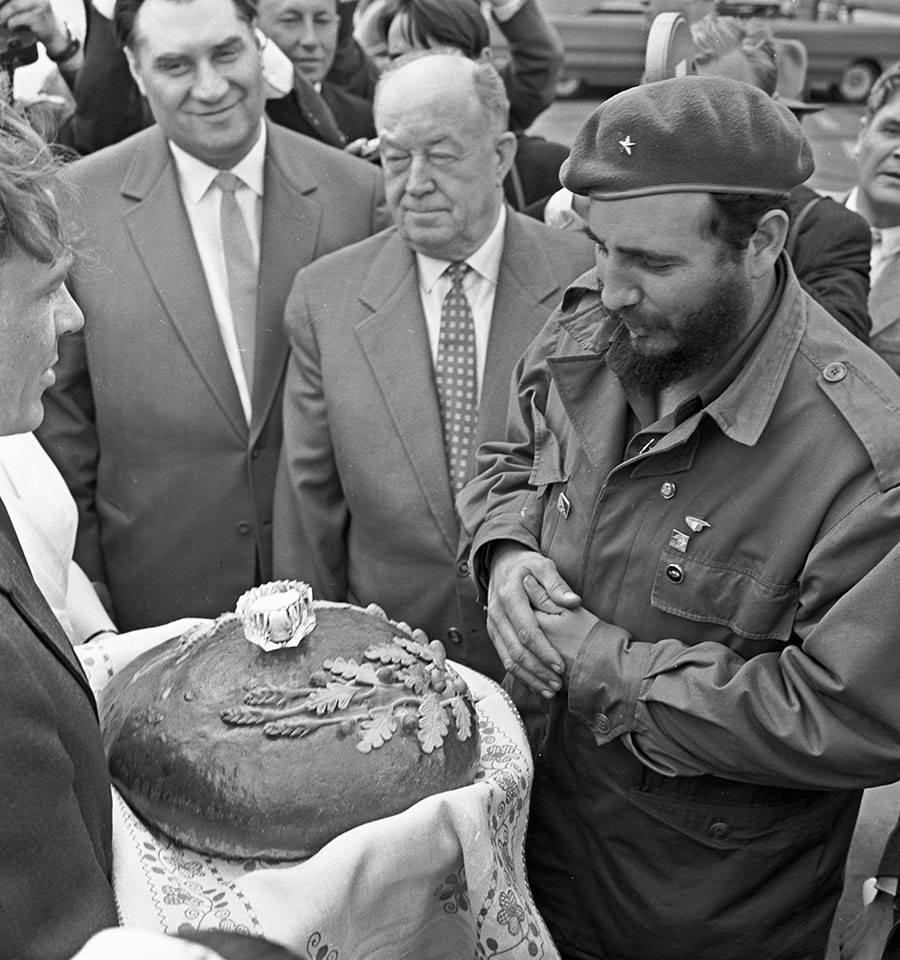
Castro arrived in the USSR amid top secrecy in late April 1963. Instead of heading to Moscow, his non-stop flight from Havana landed in Russia’s city of Murmansk. The base of Soviet submarines, located in that northern region in the town of Severodvinsk, was the Cuban leader’s first destination. He was the only foreigner to be allowed to set foot to a nuclear sub, and he got all excited about it. The Soviet military even showed him a loaded nuclear missile.
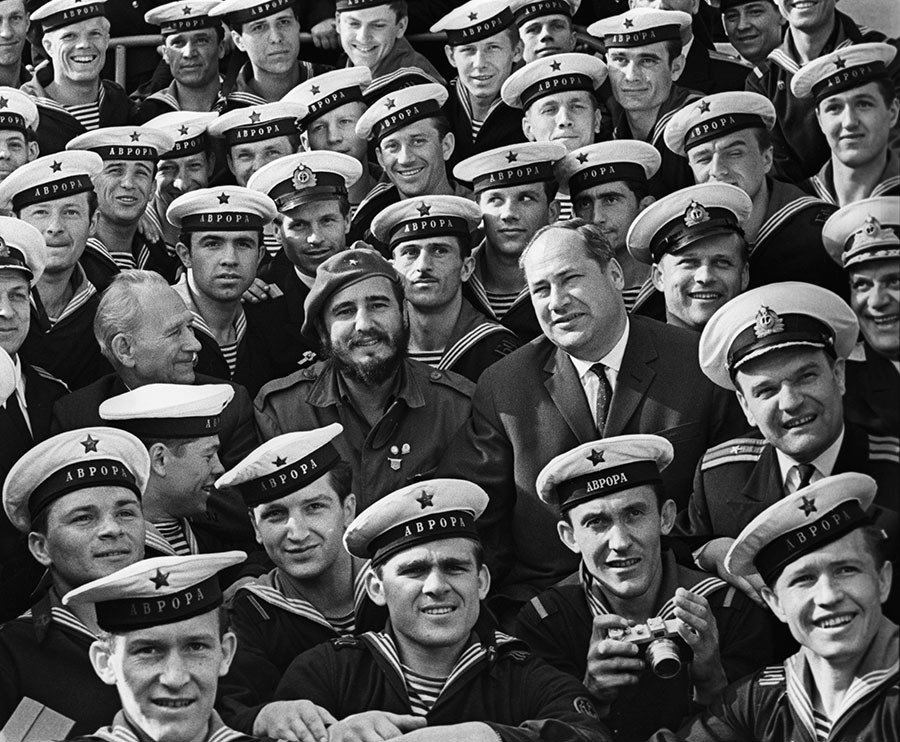
Starting from the country’s north, Castro then visited more places in Russia and then Soviet republics than any other foreign and even Soviet leader. Everywhere he went, he got a warm welcome from the Soviet people, and that’s what he said he loved most of all.
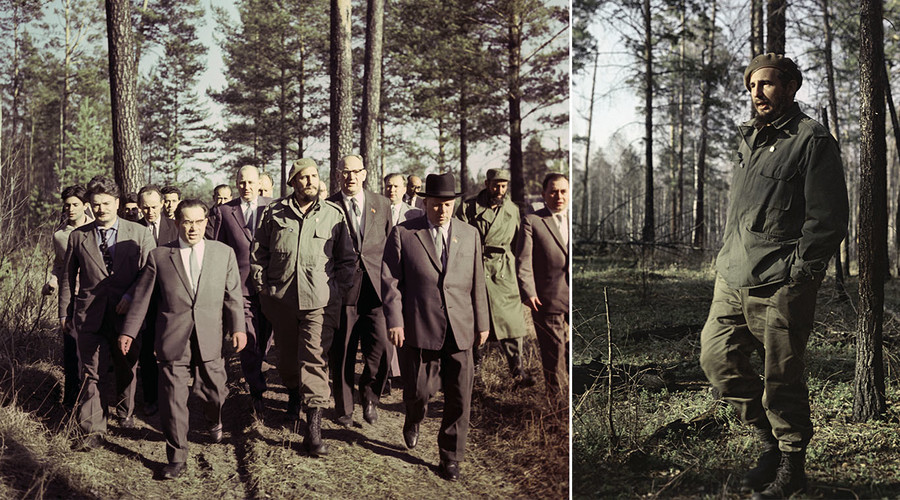
When touring Siberia, the Cuban revolutionary leader’s train got surrounded by lumberjacks, who somehow learnt Castro was in their area and refused to leave before they saw him with their own eyes. Fidel heard the noise outside, and went to see. He was caught on the train’s footstep wearing just his under shirt, while outside it was severe Siberian winter. The men didn’t want the legendary figure to leave without talking to them, and offered him a warm quilted jacket. Castro was so touched that he wanted to give the men something back, but only found three cigars in his trouser pocket. He gave them to the large crowd of men, with each of them taking just one puff before passing it on. The scene brought tears to the Cuban’s eyes. “In the West, no one would have behaved that way. A person who got the cigars first would have pocketed them. Now I understand the strength behind the Russian people,” Castro said.
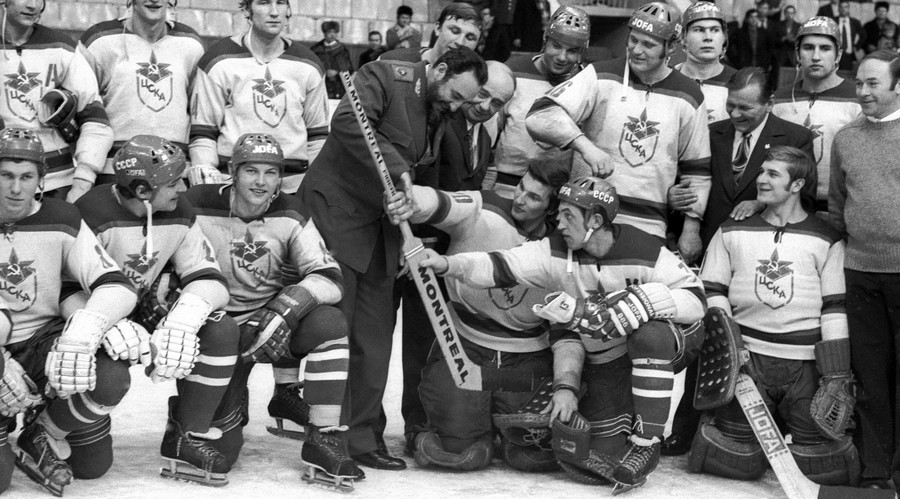
On his visit to Tashkent in Uzbekistan, Castro expressed a wish to go to a local department store. Uzbekistan’s minister of trade was put behind the counter to serve the Cuban leader, who was buying a leather belt. Fidel was furious, saying he wanted to meet the ordinary people and not the officials.
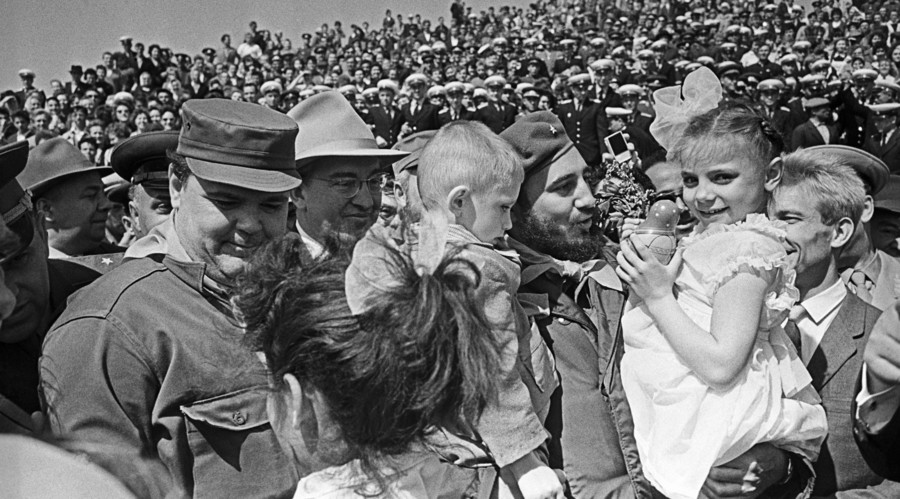
Another similar incident that happened in Leningrad (now St. Petersburg) was even reported to Khrushchev. During one of the meetings, Castro was presented with flowers by a little girl. Castro asked her to tell him which kindergarten she attended, and later said he wanted to go there to meet his little friend. Castro’s wish caught officials off guard, and they tried to avoid such a visit by all means, but the Cuban leader insisted. In the end, he was taken to a kindergarten with a shiny plate with the number Fidel remembered, where he was again met by the girl. Castro asked the child to show him around, but the girl replied: “I’m so sorry, I can still get lost, it’s only my second day here!” It turned out that the girl was from a poorer orphanage, and the officials had transferred her to an exemplary one to show off to Castro, and replaced the sign on it.
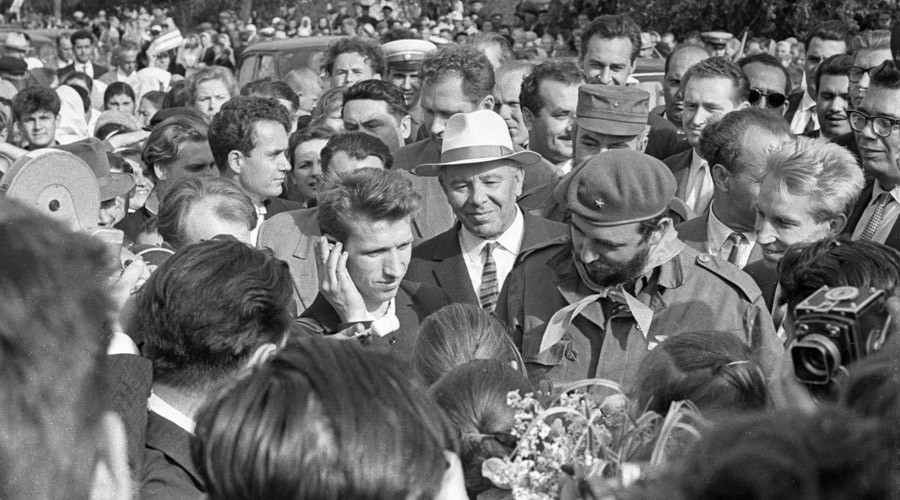
Castro criticized the authorities’ “flashiness” at an official dinner later. “You do many things to impress. I don’t need it. You are building a metro in the city, but stop such important works because of the motorcade driving me around, to be able to comfortably pass through the area. I’m not an arrogant man, I could have taken a side road not to disturb,” he told Soviet officials.
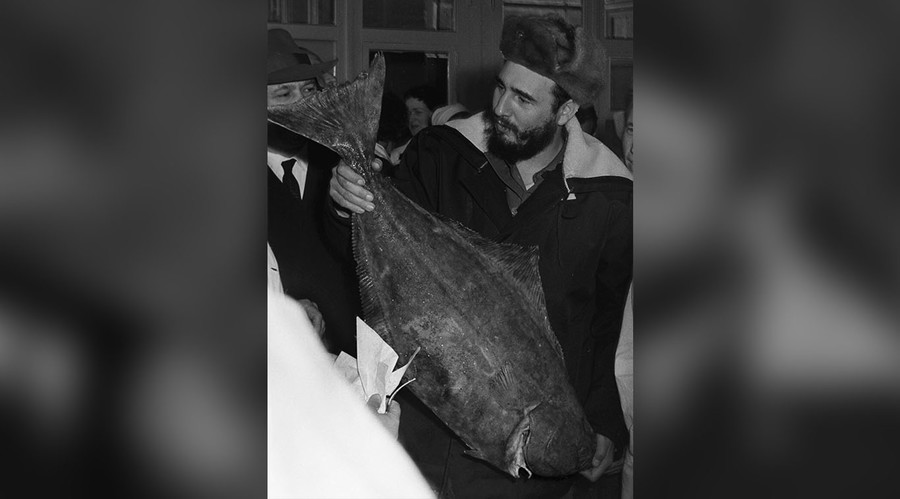
During his visit to Lake Baikal, where he was fishing with Soviet geologists, he was one day approached by a young man with a bear cub. The man said he had traveled through the taiga to see the Cuban revolutionary leader talking to people at some public rally in the region, but accidentally met him in the wilderness of the lake. He gave Castro his bear as a present, which Fidel later named Baikal. The bear then traveled with Castro to Cuba. Although provided with best conditions possible in one of the Cuban leader’s residences, the animal sadly died several years later, unable to adopt to the hot climate of the Caribbean.











